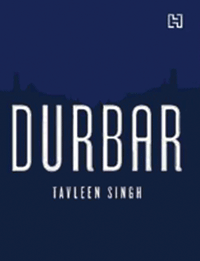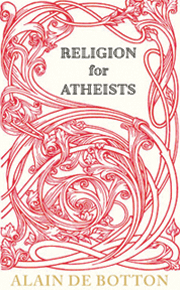Celebrity insider’s narrative
Durbar by Tavleen Singh; Hachette India; Price: Rs.599; 312 pp
 The Delhi Gymkhana, perhaps the most elitist and pretentious club in the country, invariably presided over by defence service chiefs, and top retired civil servants, has an intellectual facade in the form of a book club. Every month the club management selects a recently published book and invites the author for an interaction with club members when copies of the book, signed by the author, are also available for sale.
The Delhi Gymkhana, perhaps the most elitist and pretentious club in the country, invariably presided over by defence service chiefs, and top retired civil servants, has an intellectual facade in the form of a book club. Every month the club management selects a recently published book and invites the author for an interaction with club members when copies of the book, signed by the author, are also available for sale.
This monthly event usually attracts 30-40 members. Tavleen Singh’s Durbar, however, drew an audience of over 400. The hall was overflowing and extra chairs had to be hastily commandeered. Tavleen who writes a weekly column for the Indian Express and has authored three books (including one on Kashmir), is clearly a media celebrity, at least in Delhi. The irony is that the audience at the Delhi Gymkhana comprised the type of people Tavleen excoriates in her book, but who nevertheless lapped up what she had to say. This reviewer, who was in the audience, also found it rather odd that Tavleen, reputedly liberal and secular, heaped praise on hardline BJP Gujarat chief minister Narendra Modi.
Be that as it may, Durbar is a memoir of her years in journalism, starting in 1975 and ending with Rajiv Gandhi’s assassination in 1991. She joined the Statesman as a reporter when she was 25 after working as a trainee reporter in Slough, UK for an obscure evening daily. When she began her career in journalism, prime minister Indira Gandhi had declared India’s first and as yet sole state of Emergency, when most opposition leaders were detained without trial, and newspaper censorship was imposed countrywide.
Tavleen soon became part of an inner circle that included Rajiv and Sonia Gandhi. Others within Delhi’s charmed circle during the 19-month Emergency were Akbar (‘Dumpy’) Ahmed, Naveen Patnaik (now a long-serving chief minister of Odisha), designer Romi Chopra, Martand (‘Mapu’) Singh, his brother Arun (Rajiv’s closest friend and adviser, until they fell out during the Bofors gun scandal), journalist Suman Dubey (a Doon School and Cambridge University classmate of Rajiv) and Satish Sharma (who became Rajiv’s close friend when both were pilots and who went on to become an MP). Though she freely socialised with them during the dark days of the Emergency, in Durbar Tavleen can’t disguise her contempt for them. She describes them as “sycophants”, “colonized”, “deracinated” individuals out of touch with the realities of India. Editor M.J. Akbar, under whom she served in Sunday, is portrayed as petty and tyrannical and prone to swaying with prevailing political winds.
“It was a closed circle of people who lived an upper middle class Indian existence. Nobody spoke Hindi well but that did not matter. What mattered was if you spoke the sort of English you may have learned in a public school in Dehradun. If some newly rich businessman drifted by speaking English with difficulty, he was instantly treated as an object of fun,” she writes.
The author reserves her sharpest barbs for those she refers to as the “Doon School set” and in particular for Mani Shankar Aiyar, her bete noire who had left the foreign service at Rajiv Gandhi’s behest and successfully contested a Lok Sabha election (though he lost the re-election).
However Tavleen’s animus against Doon School products doesn’t quite ring true considering she herself attended Welham Girls’ High, a sister establishment of Doon School and just as “westernised”, “deracinated” and elitist as its male counterpart. Indeed, her presumption that one has to be a non-English speaking rustic to understand and tackle the country’s problems and challenges is seriously flawed. The Indian Civil Service did a pretty good job in running India as did the IAS, its successor service in its early years after independence. The rot and widespread corruption set in when a different type, from non-English speaking economic and social backgrounds swamped the civil service, with the main motivation of capital accumulation, rather than serving the public. Yet these rooted in the soil, non-elitist new gentry according to Tavleen, are better suited to help develop India.
Equally inexplicable is her choice of constant companions. One such is ‘Dumpy’ Ahmed, close friend of Sanjay Gandhi and as opportunist and unprincipled character as you could find on the Indian political scene. Farooq Abdullah, too, evokes the admiration of the author, though he was responsible for the onset of new militancy in Kashmir, after he blatantly rigged the state legislative assembly election of 1987.
Nevertheless Durbar has an excellent Punjab section and the author’s spirited confrontation with the trigger-happy Jarnail Singh Bhindranwale, evokes admiration. This barely literate, fanatical Sikh preacher was foolishly promoted by Indira Gandhi to divide the Akalis, the main opposition to the Congress party in Punjab. This short-sighted strategy led to Operation Blue Star, during which the Indian Army attacked Amritsar’s Golden Temple prompting the subsequent assassination of Mrs. Gandhi by two of her Sikh bodyguards. In similar fashion, Rajiv Gandhi blundered — fatally as it turned out — in his Sri Lanka policy by first arming and training the Tamil Tigers (LTTE) and then sending the Indian Peace Keeping Force (IPKF) against them. Surprisingly, Tavleen’s harshest barbs are directed at Rajiv Gandhi, though in the opinion of this reviewer, had he lived, Rajiv would have been a great prime minister in his second innings. Durbar also features a hilarious account of the urine-imbibing Morarji Desai and his prime ministerial office, and a marvelous description of the odious late Pakistan President General Zia-ul-Haq. “With his greased down, badly dyed black hair and his permanent smile under his caterpillar-like moustache he looked as if he were a clown playing a role,” she writes.
The book also contains interesting gossip, such as Sonia Gandhi’s fondness for the wildly expensive Russian sable furs and shahtush shawls, and an unsubstantiated allegation that Operation Bluestar was actually Rajiv Gandhi’s brainchild. Indira Gandhi, according to the author, was “deeply religious”. “She wore around her neck at all times a string of sacred rudraksha beads, believed to have been given to her by a woman guru she was a devotee of, called Anandamayi.”
In sum, Durbar is a good read, particularly if you are opposed to the ‘dynasty’ and are looking for an insider’s narrative of goings-on in the tumultuous period 1975-91. In terms of economic growth opportunities lost, these were wasted years. And this memoir disappoints in that it provides few insights on what’s wrong with the country and what needs to be done to set it right.
Rahul Singh
Faith reappraised
Religion for Atheists by Alain de Botton; Penguin Books; Price: Rs.299; 320 pp
 Historically, believers and non-believers have been viscerally opposed to each other in their ways of perceiving life and the meanings they supply to it. Believers and sceptical atheists have been at loggerheads, and much blood has been spilled in often deadly conflicts inter se. While followers of differing faiths have fought — and continue to fight — periodic efforts are made to bring them together to explore possibilities of peaceful co-existence and inter-faith dialogue. On the other hand, God believers and practitioners of faith tend to completely rule out the possibility of engaging with atheists. There is nothing at all, they believe, they can learn from them. Atheists are equally firm in their belief of the worthlessness of religion, and instinctively rule out dialogue with believers in blind faith.
Historically, believers and non-believers have been viscerally opposed to each other in their ways of perceiving life and the meanings they supply to it. Believers and sceptical atheists have been at loggerheads, and much blood has been spilled in often deadly conflicts inter se. While followers of differing faiths have fought — and continue to fight — periodic efforts are made to bring them together to explore possibilities of peaceful co-existence and inter-faith dialogue. On the other hand, God believers and practitioners of faith tend to completely rule out the possibility of engaging with atheists. There is nothing at all, they believe, they can learn from them. Atheists are equally firm in their belief of the worthlessness of religion, and instinctively rule out dialogue with believers in blind faith.
In this thought-provoking book, popular Swiss/British author (Essays in Love, How Proust can Change your Life, Status Anxiety and Architecture of Happiness), philosopher, and television host Alain de Botton argues for a partial reconsideration of the atheist position on religion. An atheist himself, de Botton presents a thoughtful case for re-thinking some of their deeply-held prejudices against religion. He delineates several aspects of popular religiosity which, he says, atheists could well emulate to infuse their lives with greater emotional depth.
Based on appreciative analyses of popular Christian, Buddhist and Jewish scripture, de Botton contends there’s much atheists can learn from religion which fulfills man’s emotional needs and his quest for the meaning and mystery of existence, which hard-nosed atheism, rooted in crass materialism, fails to address. Crucial in this regard is the emphasis all religions place on the ideals of care and compassion, mercy and forgiveness.
Religions invariably stress the importance of transcending narrow self-centredness, which de Botton discerns as the handmaiden of “capitalist modernity”, and atheists would do well to learn from the capacity of the devout to empathise with, and share the pain of strangers. It will provide them a sense of meaning and purpose beyond self-aggrandisement and enable them to experience the emotional comfort that religion, with its stress on piety and compassion, has traditionally provided. Even if religion isn’t true, why can’t we enjoy the best bits, asks the author.
Although an unbeliever, the author forthrightly acknowledges that the decline of religiosity has resulted in the collapse of traditional forms of communal life which though often oppressive and stifling, also provide warmth, comfort, hope, safety and sense of purpose. Atheism has singularly failed to develop an alternative to communal life, leaving individuals pretty much alone to fight life’s battles.
The important role played by the devout and particularly men and women of the cloth in dissemination and universalisation of education finds ready approval in de Botton’s book. The focus of missionary education, the author concedes, was on developing cardinal values and the human personality as a whole, and not merely on the sharpening of intellect. In contrast, de Botton accepts that modern education, based on atheist and materialistic premises, almost completely ignores ideals leaving it to individuals to develop their own value premises and behavioural norms. This has had woeful consequences for peoples’ emotional lives and their capacity to handle relationships, also leaving them bereft of any purpose in life other than participation in the maddening race for material gratification.
Mercifully, Religion for Atheists is not another debate between believers and non-believers which has been done to death. It’s essentially a call for appreciation by atheists of a more reflective way of life, and what the author regards as the finer aspects of popular religions. One hopes the book will provoke religionists to similarly rethink their position on atheism. There’s also much that believers can learn from atheists’ weltanschauung, especially from their critique of the crass ignorance, corruption, superstition and oppression which is practiced under the cover of religion.
Yoginder Sikand















Add comment